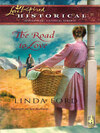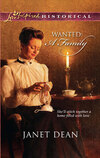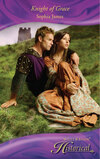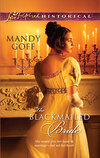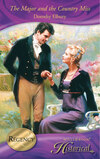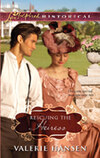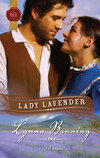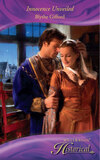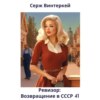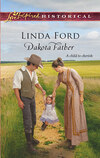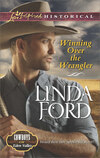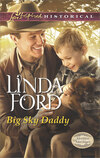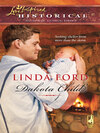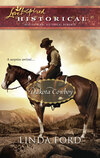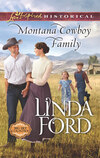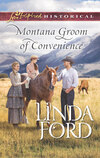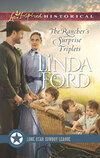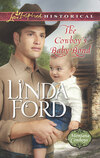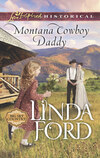Read the book: «The Road to Love»
“What is it that makes a man leave
his home?” Kate asked.
“Every man has his own reasons,” Hatcher replied, while hammering a fence staple.
“Like what?”
“Some have no place to go. Some no place to stay.”
She carefully considered him. “Which are you?”
He shrugged, moved along the fence and pounded in three more staples.
She followed after him, carrying the bucket containing the fencing supplies. “Where did you start from?”
“No place.”
“Are you expecting me to believe you were raised by wolves?”
He smiled. “Why does it matter?”
“I’m just making polite conversation. Are you from back east?”
Stubborn woman wasn’t going to let it go. “Can’t remember.”
“Can’t or don’t want to?”
“Yup.”
“Fine. Don’t tell me. It’s just that I’m so very grateful for my home and feel sorry for anyone who doesn’t enjoy the same blessings.”
She was indeed blessed, but he kept his thoughts to himself….
MILLS & BOON
Before you start reading, why not sign up?
Thank you for downloading this Mills & Boon book. If you want to hear about exclusive discounts, special offers and competitions, sign up to our email newsletter today!
Or simply visit
Mills & Boon emails are completely free to receive and you can unsubscribe at any time via the link in any email we send you.
LINDA FORD
shares her life with her rancher husband, a grown son, a live-in client she provides care for and a yappy parrot. She and her husband raised a family of fourteen children, ten adopted, providing her with plenty of opportunity to experience God’s love and faithfulness. They had their share of adventures, as well. Taking twelve kids in a motor home on a three-thousand-mile road trip would be high on the list. They live in Alberta, Canada, close enough to the Rockies to admire them every day. She enjoys writing stories that reveal God’s wondrous love through the lives of her characters.
Linda enjoys hearing from readers. Contact her at linda@lindaford.org or check out her Web site at www.lindaford.org where you can also catch her blog, which often carries glimpses of both her writing activities and family life.
The Road to Love
Linda Ford
This one thing I do, forgetting those things which are behind, and reaching forth unto those things which are before.
—Philippians 3:13
I am privileged and honored to have a special critique partner who encourages and challenges me. Without her my struggles to map out my stories would be more painful and, at times, even fruitless.
Thanks, Deb. I couldn’t do it without you. This book is lovingly, gratefully dedicated to you.
Contents
Chapter One
Chapter Two
Chapter Three
Chapter Four
Chapter Five
Chapter Six
Chapter Seven
Chapter Eight
Chapter Nine
Chapter Ten
Chapter Eleven
Chapter Twelve
Chapter Thirteen
Chapter Fourteen
Chapter Fifteen
Chapter Sixteen
Chapter Seventeen
Chapter Eighteen
Chapter Nineteen
Question For Discussion
Chapter One
South Dakota
Spring, 1933
The windmill stood tall and stately like a prairie lighthouse.
Kate Bradshaw shivered. She would sooner walk barefoot through a thistle patch than have to climb up there and grease the gears. But she had no choice. They must have water. She shuddered to think what would happen if the windmill quit and edged toward the ladder.
God willing, the drought would end soon, but the drifts of dust along the fence line reminded her how dry last year had been—and the two before that. She prayed the hint of spring green in the trees promised a better year ahead.
She’d put off the task as long as she could, hoping a friendly neighbor might happen by and offer to mount that high ladder and perform the dreaded task. None had.
The only sign she saw of another soul besides her children was a thin twist of smoke rising from inside the circle of trees across the road.
Another tramp, she suspected. One who preferred his own company to hanging about with the bunch near the tracks. Wandering men were a sign of the times. The crash and the drought had left hundreds of men unemployed. Homeless. Desperate.
“Momma, hurry up. I want to see you do it.” Dougie, her son, just barely seven, seemed to think everything was an adventure. He didn’t understand the meaning of the word caution.
Which gave Kate plenty of reason to worry about him. More than enough dangers lurked about the farm. Yet she smiled at her young son, loving every inch of him. He possessed her brown eyes and brown hair but looked like his father. He’d grow into a handsome man.
Mary, her blue eyes wide as dinner plates, tugged at Kate’s arm. “Momma, don’t. I’m scared.” A tear surfaced in the corner of each eye, hung there a moment then made parallel tracks down Mary’s cheeks.
Kate sighed. This child, her firstborn, a fragile nine-year-old, feared everything. The animals. The machinery. The sounds in the night. The wind. If it had been the roaring, moaning wind that shook the house, Kate could have understood. But Mary hated even the soothing, gentle wind, as much as she did the distant cry of coyotes, lonely and forlorn for sure, but never scary. Mary would never admit it to her mother, but Kate felt certain her daughter feared her own shadow. Even as she wiped the tears from Mary’s face, she shoved back the impatience this child’s weakness triggered in her. And wondered how such a child could be flesh of her flesh, how two such different children could have both sprung from the same union, the same loins.
She patted Mary’s blond head. “I have to, unless we want the whole thing to break down.”
Dougie bounced up and down, barely able to contain his excitement. “I can help you.” He headed for the ladder.
More out of protective instinct than necessity Kate lurched after him. Thankfully, she knew, he was too short to reach the bottom bar.
At her brother’s boldness, Mary wailed like a lost lamb.
“Dougie, stay back,” Kate said. “I’ll do it. It’s not such a big job. Your poppa did it all the time. Don’t you remember?”
“No.” Dougie’s smile faded. His eyes clouded momentarily.
Mary’s eyes dried as she proudly recalled having seen her father climb the windmill many times. “I was never scared when Poppa did it,” she added.
Kate ached for her daughter. No doubt some of Mary’s fears stemmed from losing the father she adored. Her daughter’s screaming night terrors pained Kate almost as much as the loss of her husband. Hiding her own fears seemed the best way to help the child see how to face difficult situations so Kate adjusted the pair of overalls she had donned and marched to the windmill, grabbed the first metal rung and pulled herself up. One bar at a time. Don’t look down. Don’t think how far it is to the top. Or the bottom.
Be merciful to me, O God, be merciful unto me: for my soul trusteth in thee: yea, in the shadow of thy wings will I make my refuge, until these calamities be overpast.
The metal bit into her palms.
She hated the feeling that headed for the pit of her stomach as she inched upward, and continued as though the bottom had fallen out of her insides. But she had to ignore her fear and do this task.
She paused at the platform, loathing the next part most of all. Once she stood on the narrow wooden ledge…
Now was not the time to remember how Mr. Martin fell off while greasing his windmill and killed himself. She would not imagine the sound his body made landing far below.
A crow cawed mockingly as it passed overhead.
The Lord is my shepherd; I shall not want. He maketh me to lie down in green pastures: he leadeth me beside still waters.
There would be no water for the Bradshaw family or their animals if she didn’t take care of this task.
She no longer missed Jeremiah with a pain like childbirth, no longer felt an emptiness inside threatening to suck the life from her. The emptiness still existed, but it had stopped calling his name. What she missed right now was someone to do this job.
Shep barked and growled. The dog must sense the man across the road.
“Be quiet,” Dougie ordered. Shep settled down, except for a rumbling growl.
Kate mentally thanked the dog for his constant protection of the children.
The wind tugged at her trouser legs.
She clung to the top bar. This farm and its care were entirely her responsibility unless she wanted to give up and move into town, marry Doyle—who kept asking even though she told him over and over she would never give up her home or the farm. Which left her no option but to get herself up to the platform and grease the gears.
“Ma’am?”
The sound of the unfamiliar voice below sent a jolt of surprise through Kate’s arms, almost making her lose her grip on the metal structure. She squeezed her hands tighter, pressed into the bars and waited for the dizziness to pass before she ventured a glance toward the ground. She glimpsed a man, squat from her overhead view and with a flash of dark hair. But looking down was not a good idea. Nausea clawed at her throat. She closed her eyes, pressed her forehead to the cool bar between her hands and concentrated on slow, deep breaths.
“Ma’am. I could do that for you.”
The tramp from the trees no doubt, scavenging for a handout. Willing to do something in exchange for food as most of them were. But why, God, couldn’t you send nice Mr. Sandstrum from down the road? Or one of the Oliver boys?
“I can’t pay,” she said. Jeremiah had left a bit of money. But it had been used up to buy seed to plant new crops and provide clothes for the growing children.
“I’d be happy with a meal, ma’am.”
A glow of gratitude eased through her. She’d feed the man for a week if he did this one job. But she hesitated. How often could she count on someone to show up and handle every difficult situation for her? She needed to manage on her own if she were to survive. And she fully intended to survive. She would keep the farm and the security it provided for her and the children, no matter what.
No matter the hot, dry winds that dragged shovelfuls of dust into drifts around every unmovable object, and deposited it in an endless trail through her house.
No matter the grasshoppers that clicked in the growing wheat, delighting in devouring her garden and making Mary scream as she ran from their sticky, scratchy legs.
No task, not even greasing the windmill, would conquer her.
“I can manage,” she called, her voice not quite steady, something she hoped those below would put down to the wind.
“Certain you can, ma’am.” After a pause, the man below added softly, “It’s been a fair while since I had a good feed. Could I do something else for you? Fix fence…chop wood?”
Kate chuckled softly in spite of her awkward position. She wished she dared look down to see if he meant to be amusing. “Mister, if you chop all the wood in sight, there wouldn’t be enough to warm us one week come winter. We burn coal.”
The man laughed, a regretful sound full of both mirth and irony. “Don’t I know it.” he said.
The pleasure of shared amusement tickled the inside of the emptiness Kate had grown used to and then disappeared as quickly as it came.
He continued. “Makes it hard for a man to stay warm in the cold. Doubly hard to cook a thick stew even if a man had the makings.”
Kate knew the feeling of unrelenting cold, hunkering over a reluctant fire, aching for something warm and filling to eat. Seemed no matter how long she lived she’d never get over that lost, lonely feeling. It was this remembrance that made her ease her way down the ladder.
She sighed heavily when her feet hit solid ground.
Shep pressed to her side.
Grateful for the dog’s protection, she patted his head to calm him, and glanced about for her children.
Dougie bounced around the stranger, boldly curious while Mary had retreated to the shadow of the chicken house. Knowing how much Mary hated and feared the chickens, her choice of safety seemed ironic.
Kate faced the man.
He was taller than he looked from above, bigger, and lean to the point of thinness, his black hair shaggy and overly long, his skin leathered and brown from living outdoors, his eyes so dark she couldn’t see the pupils.
But she liked the patient expression of his face. He looked the sort of man who would be unruffled by adversity. She mentally smiled. A roving man no doubt had his share of such.
His clothes were threadbare but clean.
It said a lot for a man that he managed to look decent under his present circumstances. And what it said made her relax slightly.
The tramp rolled a soiled cowboy hat in his fingers, waiting for her to complete her study of him. Suddenly, he tossed the hat on the ground and reached for the bucket of grease.
At first she didn’t release the handle. She would have to do this job sooner or later. Then she let him take the bucket. Later suited her just fine.
He scurried up the windmill with the agility of a cat.
Kate watched his progress, squinting against the bright sun. Her chest tightened as he stepped to the platform and the wind tossed his hair. She shuddered when she realized he didn’t hang on. She pulled her gaze from the man and grabbed Dougie’s arm, putting an end to the way he bounced up and down at the ladder, trying to reach the first rung.
“Come on, the man is going to want to eat when he’s done.” If she didn’t provide a decent meal he would no doubt leave one of those hobo signs at the gate indicating this farm provided mean fare. Why should she care? But she did. She still had her pride.
“Mary, come on. I need your help.” Mary shrank back while Dougie tried to pull from her grasp. Seemed to be the way she always stood with them—holding Dougie back, urging Mary on.
She’d planned bread and fried eggs for them. Now she had to scrape together something for a regular meal. And she still needed to milk the cows, separate the milk, set bread to rise, a hundred other little tasks beyond measuring or remembering.
“Come, Mary.” Her words were sharp. She sounded unforgiving. But she didn’t have time to coddle the child.
Mary jerked away from the building and raced to her side.
As Kate shepherded both children to the house, she mentally scoured the cupboards for what to feed the man.
“Dougie, get me some potatoes.” As she tugged off the coveralls and hung them on a hook, he hurried away, eager for the adventure of the dark cellar.
Kate smoothed her faded blue cotton dress. “Mary, bring me a jar of canned beef and one of green beans.” Mary went without crying only because Dougie traipsed ahead of her.
Kate poured a cup of raisins into a pot and covered them with water to boil then scooped out a generous amount of her homemade butter and measured out half a cup of her precious sugar. She added the softened raisins, flour and spices then put the cake in the oven while the children did as she said.
Dougie brought back a basin full of potatoes, wizened and sprouted after a winter in storage.
Not much, but still she was grateful she had food for her children. She peeled the potatoes as thinly as possible so as not to waste a bit and set them to boil. She gathered the peelings in a basin to later take to the chickens.
Dougie watched out the window, giving a step-by-step description of what the man did. “He greased it. He’s climbing down. Sure isn’t scared like you are, Momma. He put the grease pail on the ground. He’s watering the cows.” The boy dashed out of the house.
“Dougie, wait.” The skin on the back of Kate’s neck tingled as she hurried to the door. She couldn’t trust her child with a stranger.
Dougie raced to the man, spoke with him a minute and ran back to her. “Momma, his name is Hatcher. He says he’ll milk the cows.”
Hatcher? Sounded too much like hatchet for her liking. Was it his nickname? Earned by the deeds he did? She didn’t like to judge a man prematurely but she’d sooner be overly cautious than have someone named Hatcher hanging around. “No. I’ll do it,” she said.
But Dougie grabbed the galvanized tin buckets and headed back outside before she could stop him. He rejoined the man who took the pails but stood watching Kate, waiting silently for her agreement.
Again she felt his quiet patience. Jeremiah had been like that. Slowly, she nodded, and her son and the man disappeared into the barn.
Suddenly a whole stream of worries assailed her. Was she foolish to let her son out of sight with a tramp? On top of that, she wondered if the man knew how to milk properly. Would she have to go out and strip the cows? She couldn’t let them go dry. The milk fed herself, the children, the pig and the chickens. Besides providing their butter, the cream gave them the only cash they would have until the crop was seeded, and harvested. And that depended on having rain when they needed it, no grasshoppers to eat the crop and a hundred other things. “It’s in God’s hands,” she whispered. “He’ll take care of us. He’s promised.” She forced herself to dwell on these comforting words yet threads of concern knitted around the promise.
She stood in the doorway, torn between hurrying out to the barn and the need to prepare the meal. The cake was almost ready to come out. If she left it now, they’d have burned sacrifices for supper.
“Mary, sit on the step and watch the barn.”
“What for, Momma?”
“Just watch it and let me know if anyone comes out.” She shoved her daughter outside, ignoring the stark fear in her eyes. “All you do is sit here. I have to finish supper.”
She tested the cake, put it back in the oven, pushed the boiling potatoes to a cooler spot on the stove and emptied the meat and beans into pots to heat.
Mary clattered inside. “Momma,” she whispered.
“Ma’am?”
The deep voice, unexpected as it was, startled Kate. She jerked her gaze to the man standing in her doorway, two foamy pails of milk in his hands.
Dougie raced in behind the man.
Kate let her tense chest muscles relax knowing the boy was safe and sound.
The man carefully avoided looking at her as he set the pails on the worn wooden table next to the door and retreated.
“Supper is ready,” she told him. “Make yourself comfortable while I dish you up a plate.” She nodded to the step indicating he should wait there. When Dougie prepared to join the man, Kate called him inside. He reluctantly slouched indoors.
Kate dished up generous portions of food and carried the plate to the man.
He nodded. “Thank you, ma’am. Name’s Hatcher Jones.”
Kate hesitated then gave her name. “I appreciate your help, Mr. Jones. I’ll bring you dessert in a few minutes.” She ducked back inside, closed the door behind her, served the children and herself, all the time aware of Hatcher Jones on the other side of the solid wooden door. It made her feel awkward to sit at the table while he sat on the step, yet nothing in the world would persuade her to invite him inside the house. Most hobos were ordinary men on the move looking for work wherever they could find it but even without Mary’s frightened look she became acutely conscious of the vulnerability of her two children.
Mary and Dougie finished and Kate deemed the cake cool enough to cut. She put a generous slice in a bowl, poured on thick, cool cream and took it outside.
Hatcher Jones handed her his spit-clean plate and took the bowl of dessert, his eyes appreciating the food as he murmured his thanks.
Kate hovered at the doorway, breathing in the pleasure of her farm. “Where are you from, Mr. Jones?”
“From nowhere. Going nowhere.” He seemed preoccupied with the bowl of food.
“You must have belonged somewhere at some time.” The idea of being homeless, having no roots still made her tense up inside. She couldn’t stand the thought of someone out there, hunkered over a lonely campfire. Cold, wet, miserable, vulnerable to prying eyes. It was a too-familiar sensation she couldn’t shake. Not even after all these years.
He shrugged. “Too long ago to matter.”
“Going anywhere in particular? I hear a lot of men are heading toward the coast.” She chuckled. “At least it rains there.”
“Been there. Seems all it did was rain.”
“So you didn’t like it?”
Again he shrugged, a languid one-shoulder-higher-than-the-other gesture that said better than any words that he was short on opinions about such things. “Can get too much of even a good thing.”
“You surely can’t like this drought better’n rain. Even too much rain.”
“Drought or rain. What’s the difference? Man just has to make the best of it.”
“A woman does, too.”
He glanced over his shoulder to her. “It’s not easy.”
“No. It’s not. But we do okay.”
He nodded and looked across the fields. “How much land you got here?”
“Two quarters.”
“How much in crop?”
“A hundred acres.”
He grunted. “Planning to put it all down to wheat?”
How long had it been since anyone had asked her about her farm? Doyle’s only question was when did she intend to get rid of it and marry him? Her answer was always the same. Never. This farm belonged to her. Lock, stock and piles of dust. She would never let it go or even take out a mortgage on it.
Even Sally, dear friend that she was, couldn’t understand Kate’s dedication to the land. All Sally could think was how fortunate Kate was to have a beau such as Doyle. Handsome, debonair, well-off, a lawyer with a big house. “You could quit working like a man,” Sally said often enough.
Kate drew in a long breath full of spring sweetness. The smell of new growth. Who’d believe green had its own scent? She’d once tried to explain it to Doyle and he’d laughed. Unfortunately the endless dust drowned out all but tantalizing hints of the freshness. So far this spring there hadn’t been any blinding dust storms but no significant amounts of rain, either. What was the official total? .06 inches. Hardly worth counting.
She gathered up her shapeless plans for the spring work and put words to them. “I want to put in some corn. Seems to me it’s pretty hardy once it’s tall enough the gophers don’t eat it off.”
“No problem with blackbirds attacking it?”
“Some. But there’s a bonus to that. They’re good eating. ‘Four and twenty blackbirds baked in a pie.’”
He straightened his shoulders inside his worn blue shirt, hesitated as if to consider her words and then grunted in what she took for amusement. “God’s blessings often come disguised.”
She stared at his back, saw his backbone edging at the faded blue of his shirt. A hobo who talked about God? Even more, about God’s blessings. She couldn’t keep herself from asking, “What blessing is disguised in being homeless?” She could recall none.
He lifted his head and looked out across the field. She wondered what he saw. Did the open road pull at him the way it had her father?
“There are certain advantages.” He spoke softly, with what she could only guess was a degree of gratitude.
She rubbed at a spot below her left ear where her jaw had knotted painfully and tried not to remember how she’d hated the constant moving, the never knowing where home was or where they would sleep. Every time they settled, even knowing it was temporary, she hoped this would be the last time they moved. There was no last time for her father, still restlessly on the move. But a time came when Kate refused to move on. She felt no call to wander. No appeal of the long winding road.
Hatcher Jones considered her. “A hundred acres to seed this spring? Quite a job. You got a tractor by any chance?”
She gladly pulled her thoughts back to the farm—her home, her security. “I got me a tractor.” She’d managed to limp it through last year with the help of the oldest Oliver boy whose ability and patience coaxed it to run. But since Abby Oliver headed north, she had no one to help her. “It needs a few repairs.” She almost snorted. A few repairs. It was as pathetic as measuring .06 inches of precipitation and calling it rain.
Hatcher pushed to his feet. “I’ll be moving on. Again, thank you for the meal.”
“You’re welcome. Thank you for taking care of the windmill.” The rotary wheel hummed quietly on the tower. No more protesting squeal of dry gears. Another month before she’d have to brave the heights again.
Hatcher stood with his hat in his hand, looking as though he had something more he wanted to say. Then he jammed the blackened hat on his head and nodded. “Good food. Thank you.”
Kate laughed. “Does that mean you won’t post a secret sign at the end of the lane warning hobos away?”
She couldn’t see his eyes, hidden under the shadow of his hat, but his mouth flashed a quick smile.
“No, ma’am. But I won’t be letting others know how good a cook you are, either. Wouldn’t want a whole stream of hungry men descending on you.” He gave a quick nod.
“Now I’ll leave you in peace. God bless.”
She watched him stride away, his long gait eating up the road in deceptive laziness and suddenly, she felt lonely. She thought of calling him back. She wanted to talk more about the farm. Ask him what he’d seen in his travels. How severe was the drought in other places? Did he really see God’s blessing in the hardships he witnessed and experienced? She sighed deeply, pushing her useless longings out as she exhaled. Then she returned to the many chores still waiting.
She strained the milk and separated it.
“Mary, hurry out and shut in the chickens. Take out these peelings.” She handed her the basin and ignored Mary’s wide-eyed silent protest. “We can’t afford to lose any of them.” The child had to get over her unreasonable fear of chickens. “Dougie, go put the heifers into the corrals and make sure the gate’s tightly latched.” He was really too small to chase after the animals but she couldn’t be everywhere at once. “Hurry now before it gets dark.” She’d run out and help Dougie as soon as she finished the milk. And if the past was any indication, she’d end up dumping the basin of peelings. Mary never seemed to get any farther than the fence where she tried to poke the contents through the wire holes.
Kate prayed as she worked. God, protect the children. Help Mary realize she’s bigger than the chickens. Help me find a way to get my crop in. She stilled her thoughts. As usual, her prayers seemed an endless list of requests. But she had nowhere to turn but to God who promised to provide all her needs. Seemed to her a God who owned the cattle on a thousand hills and held the waters in His hand could send a little rain to her area of the world. Lord, help me be patient. I know You will provide for us. You’ve promised. A smile curved her lips. Thank You that I didn’t have to grease the windmill. A blessing in the form of a hobo. God must surely have a sense of humor.
She scoured the milk buckets and turned them upside down to dry, poured boiling water through the separator and cleaned it thoroughly.
Normally the work kept her mind adequately occupied but not tonight. One hundred acres to seed. A tractor that refused to run. And no help. She needed a hired man. One with experience. One with the ability to fix the tractor. One who didn’t expect anything more than his keep. She knew no such person. She’d run an ad in a few papers but the responses were disappointing at best and downright frightening in the case of one man who made very inappropriate suggestions. Of course, as Doyle always pointed out, she had the option of selling the farm and accepting his offer of marriage.
As she dashed to the barn to help Dougie, pausing at the chicken yard to take the basin from Mary and toss the peelings into the pen, she wondered if she was being stupid or stubborn to cling to this piece of property. Probably both, she willingly admitted, but she wasn’t ready to give up the only permanent home she’d ever known.
The sun sat low on the western horizon brushing the sky with purple and orange and a hundred shades of pink. At the doorstep, she turned, holding a child’s hand in each of hers. As she drank in the beauty of the sunset she silently renewed the promise she’d made to herself after Jeremiah’s death. Never would her children know the uncertainty of being homeless. Not if she had to pull the plough herself.
The free excerpt has ended.

